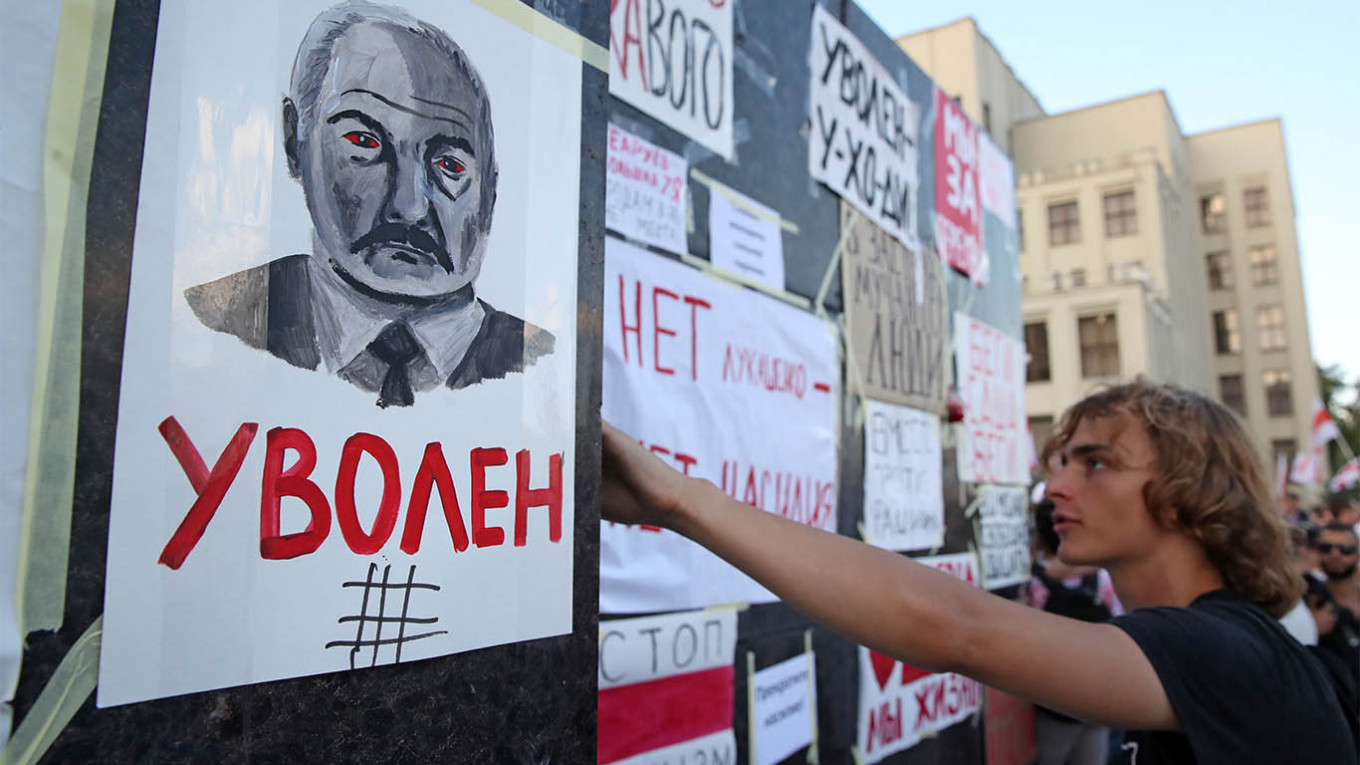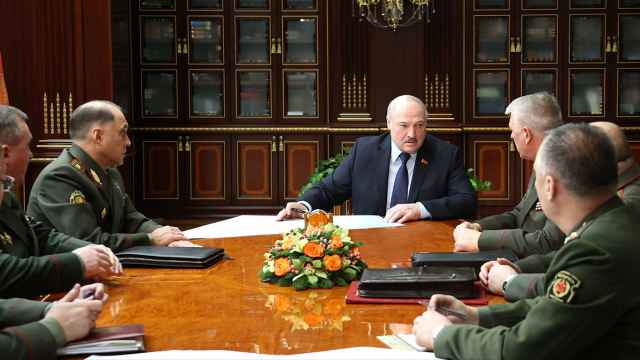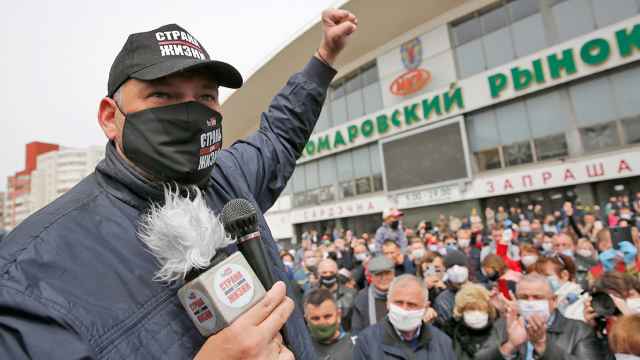The broad pattern of what’s happening in Belarus right now was anticipated months in advance. Before the election, President Alexander Lukashenko would eliminate any serious challengers, leaving only those whom he could beat without too much trouble; the vote itself would be rigged; the proclamation of Lukashenko’s victory at the polls would lead to protests; Lukashenko would put down the protests using brute force; he would then brush off outside criticism as interference in Belarus’s internal affairs, and remain in power. In other words, a replay of the 2010 elections scenario all over again.
Yet against expectations, several elements have substantially, even crucially changed the picture. One was the Wagner incident: a bizarre operation in which the Belarusian KGB arrested thirty-three suspected Russian mercenaries eleven days before the vote and accused them of having come to Minsk to stir up trouble during the elections. The arrests allowed Lukashenko to ramp up his anti-Russian rhetoric. The Kremlin, bewildered, saw this as the Belarusian ruler’s attempt to win acquiescence in the West for his re-election on a pro-sovereignty, anti-Russian ticket. Whatever trust had remained in Lukashenko in Moscow completely evaporated.
The second element was the perseverance of protesters in Minsk and across Belarus, who did not give up after several days of protest, despite being manhandled — and in many cases, savagely beaten — by the police. The brutality that Lukashenko had hoped would, as before, nip the protests in the bud led to the opposite result of widespread indignation and anger. This in turn led to the third unanticipated result: the expansion of the protests beyond the usual crowd of young Europe-orientated urbanites to include older people, even those who a couple of days before might have actually voted for Lukashenko in the election.
The situation is developing fast, and there will be more surprises down the road. Yet a few preliminary conclusions can already be made. Lukashenko’s regime has definitely lost the country. It may yet hold on to power: the ruling group composed of bureaucrats personally handpicked and constantly rotated by Lukashenko has not developed visible cracks, and the police and security services’ loyalty has been reaffirmed by the personal responsibility of their chiefs for the post-election crackdown. The classic scenario of a color revolution will not be played out in Belarus this time.
However, the president, who — had he let the election go ahead without interference, might have even won in the first round — has now lost the people’s support. Despite the official tally of 80 percent of votes cast for Lukashenko, there was no popular pushback against the street protesters. The Belarusian people, this may suggest, had their real say not on election day, but in the days that followed.
Lukashenko, the autocrat who seemingly single-handedly built the Belarusian state, could have gone down in history as the father of modern Belarus, had he chosen—even earlier this year—to resign and manage his own succession. Now he is on track for an inevitable and dishonorable exit. It may take weeks or longer, but that’s it for Lukashenko: his legitimacy is gone forever. This is the most important outcome of the recent developments. That outcome is also bringing other players to the scene, alongside the Belarusian people. A new act of the drama begins.
The strategic position that Belarus occupies on the central axis between the European Union and Russia makes the succession to the person who has ruled the country with an iron fist for twenty-six years exceedingly important for both Moscow and the West. The Kremlin is not wedded to Lukashenko: it has had enough of him. It cannot, however, allow Belarus to follow the path of Ukraine and become another anti-Russian, NATO-leaning bulwark on its borders, and much closer to Moscow. Nor can it allow a rebellion leading to a bloodbath.
So, what should be done? There are four basic options. First, a Russian military intervention in Belarus to stabilize its ally: this should be avoided at all costs because of the inevitable disastrous consequences. The second option is to do nothing and allow Lukashenko to fall, hoping that whoever comes after him will take account of Belarus’ close ties with Russia, including in the economic sphere: too risky. An upheaval may turn into a bloodbath, forcing Moscow to exercise the first option. Third is to capitalize on Lukashenko’s shattered relations with the West and envelop him in a tight embrace: counterproductive. It would make Russia an accomplice to the doomed regime, and breed hatred for Russia using Moscow’s own money. The fourth option is to look beyond Lukashenko and manage a transfer of power in Minsk.
This option would mean facilitating the Belarusian political transition by convincing Lukashenko that retirement in exile is the least bad option for him under the present circumstances. It would mean simultaneously engaging a broad spectrum of public figures in Belarus and helping a new respected caretaker leadership emerge to hold elections in due course. It would also mean sounding out Belarusians on the issues in the bilateral relationship, including the nature of the union state and its various elements. That would include the future parameters of economic and security relations between the two countries. The conversation would need to be candid, and reciprocal commitments reaffirmed or adjusted as necessary.
Managing the crisis in Belarus in a way that keeps that country a good neighbor and reliable partner for Russia may sound too modest compared to the long-sustained vision of a union state, but it is better to give up illusions and save lives and money than to allow a close relative to turn into an implacable foe. The example right next door—of Ukraine—must not be repeated.
This article was first published by the Carnegie Moscow Center.
A Message from The Moscow Times:
Dear readers,
We are facing unprecedented challenges. Russia's Prosecutor General's Office has designated The Moscow Times as an "undesirable" organization, criminalizing our work and putting our staff at risk of prosecution. This follows our earlier unjust labeling as a "foreign agent."
These actions are direct attempts to silence independent journalism in Russia. The authorities claim our work "discredits the decisions of the Russian leadership." We see things differently: we strive to provide accurate, unbiased reporting on Russia.
We, the journalists of The Moscow Times, refuse to be silenced. But to continue our work, we need your help.
Your support, no matter how small, makes a world of difference. If you can, please support us monthly starting from just $2. It's quick to set up, and every contribution makes a significant impact.
By supporting The Moscow Times, you're defending open, independent journalism in the face of repression. Thank you for standing with us.
Remind me later.








